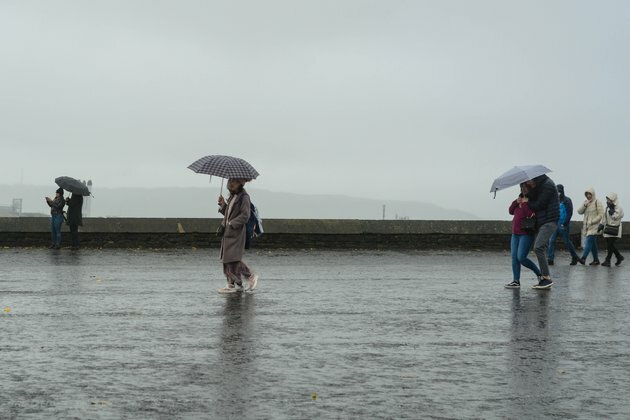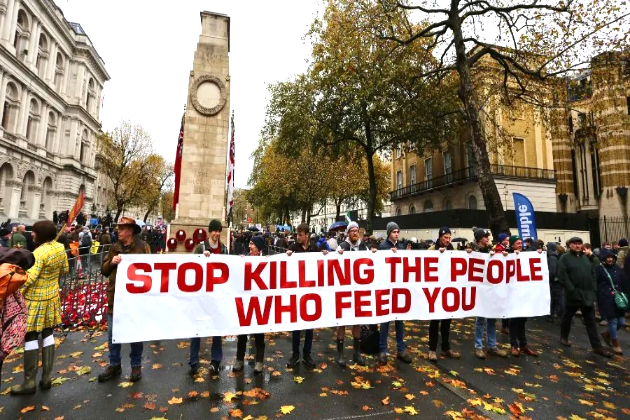Why flooding is still so difficult to predict and prepare for
The Conversation
13 Nov 2019, 19:58 GMT+10

Before you read this story, take a minute to stop and look around you. Now imagine your surroundings under two feet of dirty, sewage-filled water. If you're at home, everything is trashed. Never mind your car, your furniture or washing machine. They will be ruined, but those things can be replaced. Think of your wedding album, soaked and spoiled. The music box your grandmother gave you, full of stinking mud.
That is the reality of being flooded. And sadly, it's a reality that many people in the UK - in Yorkshire and Lincolnshire - have faced in the recent floods. Tragically, floodwater can also be life-threatening.
Read more: Flood defences simply aren't good enough - here's what needs to be done
Given the huge costs to people and property when it floods, it's a reasonable question to ask why, in one of the richest countries in the world, more cannot be done to prevent flooding. And if not prevent it, to know more precisely when and where it will hit.
As a hydrologist and a flood and hazard forecaster, I spend my life doing just that. And despite the work of some of the brightest scientists, the world's most advanced supercomputers and the commitment of hardworking people on the ground, floods are just difficult beasts to pin down. And if you've ever thought that your home could never be affected, you should know that floods can happen almost anywhere, at any time.
Modelling chaos
Some of the most wonderful aspects of the UK - the changeable weather and spectacular landscape - are also what makes the country so susceptible to flooding. When beautiful river valleys and low-lying plains - as well as cities and urban areas - are inundated with persistent rain, sudden downpours or high tides with storms, flooding can quickly follow. Especially if there is an unexpected fault in the infrastructure designed to hold back water or prevent flooding, as was seen at Whaley Bridge in Yorkshire in August 2019.
In Doncaster in early November 2019, only a slight variation in a fairly typical weather system was enough to cause flooding. Cold and warm air masses regularly press against each other close to North America, creating an Atlantic storm factory. These weather systems are often fired towards Europe too by the strength and direction of the jet stream. Damp ground in the north of England is also par for the course. But add one heavy downpour, caused by a rotating weather front getting "stuck" over one area - and you have a flood.
Weather predictions have come a long way in the past few decades - today's three-day forecast is as accurate as a 24-hour forecast was in the 1990s. But they are never perfect.
Read more: Rivers are changing all the time, and it affects their capacity to contain floods
Multiply all the uncertainty within the weather forecast with all the complexity of modelling the path of water travelling through the landscape - both above and below ground - then you start to get an idea of the difficulties forecasters face. We have to take account of all the different routes through the landscape that a single raindrop might take. There are billions upon billions of different possibilities. It requires lots of assumptions.
So much for looking into the future. What about learning from the past?
Many people in flood-hit areas have said that the floods are unprecedented. Older residents have said they have never seen anything like it. But we must remember our landscape is thousands - even millions - of years old. We need to think about much longer timescales than single human lifespans. And of course on top of this, the landscape and climate are changing - so even the best historic data don't provide a good proxy of the future.
Fishlake may not have flooded in recent years, but it is right on the floodplain of the River Don. Its watery name is probably no coincidence. Neither is that of Meadowhall, the shopping centre in Sheffield, more than likely built on a flood meadow. On November 8, it was marooned. But people tend to like living by the river - and they don't associate a beautiful riverside development with dirty water and destroyed wedding photos.
Flooding is hard to predict and prepare for. But floods happen. They always have - and we know that as the global climate warms due to human activity we are likely to see more of some types of flood in Britain. It's hard to convince people who don't know they are at risk that they should prepare for the worst.
This is where the government must step in. To better prepare for floods, we need difficult, expensive, but rational decision-making on flood defences. That would mean seriously considering the risk of building homes and businesses in the floodplain, and planning away from these areas as much as possible. If there is no other option, then the flood-proof design standards must be substantially higher. Developers must also be held to account for ensuring these standards are met and householders must be made fully aware of the risks.
Forecasts and communications of flood risks can always be improved, and my colleagues and I will be working hard on it for years to come. But residents, farmers and businesses can't be expected to face off the problem of floods on their own.
Author: Hannah Cloke - Professor of Hydrology, University of Reading 
 Share
Share
 Tweet
Tweet
 Share
Share
 Flip
Flip
 Email
Email
Watch latest videos
Subscribe and Follow
Get a daily dose of Poland Sun news through our daily email, its complimentary and keeps you fully up to date with world and business news as well.
News RELEASES
Publish news of your business, community or sports group, personnel appointments, major event and more by submitting a news release to Poland Sun.
More InformationEurope
SectionEU probes Visa, Mastercard fees amid antitrust scrutiny
BRUSSELS, Belgium: European Union antitrust regulators are examining fees imposed by payment giants Visa and Mastercard, Bloomberg...
Hundreds of children may be recalled after Dublin hip surgery audit
DUBLIN, Ireland: Nearly 500 children who had hip surgery at two Dublin hospitals between 2021 and 2023 may need to be recalled for...
US drug launch prices double in four years, Reuters finds
BRUSSELS, Belgium: U.S. drugmakers are charging significantly more for new treatments, particularly those targeting rare diseases,...
Trump re-ignites trade war, targets Europe in extraordinary attack
WASHINGTON, DC - U.S. President Donald Trump re-ignited his trade war on Friday with an extraordinary attack on the European Union...
Ireland urged to boost tech sector amid job decline
DUBLIN, Ireland: The number of people employed in social media companies in Ireland has dropped by 11 percent since 2022, according...
Farmers protest EU funding reforms in Dublin
DUBLIN, Ireland: Farmers and co-op leaders gathered outside the European Commission offices in Dublin this week, voicing opposition...
International
SectionEU probes Visa, Mastercard fees amid antitrust scrutiny
BRUSSELS, Belgium: European Union antitrust regulators are examining fees imposed by payment giants Visa and Mastercard, Bloomberg...
US Army to list only birth sex in transgender soldiers' records
WASHINGTON, D.C.: The U.S. Army plans to change the records of transgender soldiers to list only their sex at birth, according to a...
US FAA orders flight reductions at Newark Airport to ease congestion
WASHINGTON, D.C.: The Federal Aviation Administration (FAA) said this week that it will require airlines to reduce the number of flights...
Nine children from 1 family die as Israel Air force pilots hit 100 targets in Gaza
GAZA - The home of a doctor working in the emergency room at the Nasser Medical Complex in southern Gaza was struck by Israel Air...
Universal unveils Epic Universe to challenge Disney’s dominance
ORLANDO, Florida: For years, Universal Orlando played second fiddle to Disney's sprawling empire in Central Florida. Now, with the...
Biden-era fuel rules face pushback over EV inclusion
WASHINGTON, D.C.: The U.S. Transportation Department is expected to say that fuel economy rules created under President Joe Biden went...












